Homeland Security Committee applauds passage of cyber bills reauthorizing grants, addressing rising CCP-linked threats

The House Committee on Homeland Security welcomed the passage of two key measures, H.R. 5078, the Protecting Information by Local Leaders for Agency Resilience (PILLAR) Act, and H.R. 2659, the Strengthening Cyber Resilience Against State-Sponsored Threats Act. Committee leaders said the bills mark an important step in countering China’s cyber aggression and boosting national resilience.
The PILLAR Act would reauthorize the Department of Homeland Security’s State and Local Cybersecurity Grant Program, which helps state, local, tribal, and territorial (SLTT) governments address risks to information systems and OT (operational technology), including systems that incorporate artificial intelligence. H.R. 5078 was introduced and cleared the Committee in September 2025.
The bill has won support from a broad coalition that includes the Alliance for Digital Innovation, the Association of the United States Cyber Forces, the Better Identity Coalition, CSC 2.0, the Cybersecurity Coalition, the Cyber Threat Alliance, the Center on Cyber and Technology Innovation at FDD, the Global Cyber Alliance, the Information Technology Industry Council, the McCrary Institute for Cyber and Critical Infrastructure Security, NASCIO, the Operational Technology Cybersecurity Coalition, Palo Alto Networks, the Software & Information Industry Association, the Strategic Cybersecurity Coalition, TechNet, and Wiz.
Under the PILLAR Act, the State and Local Cybersecurity Grant Program would be reauthorized for seven years. The bill maintains the current cost share at 60% for single entities and 70% for multi-entity groups, matching the authorization level in place for Fiscal Year 2025. It also offers a 5% increase in the federal cost share for any entity or group that implements multi-factor authentication by Fiscal Year 2028.
The legislation adds language to ensure OT is fully captured and encourages the use of artificial intelligence where appropriate. It calls for direct outreach to small communities of all types and presses entities and consortia to plan for long-term cybersecurity costs within their own state budget processes.
“As sophisticated nation-state adversaries and criminals target our nation’s critical infrastructure and government agencies in cyberspace, it is essential that states and localities have the necessary tools to protect the networks our communities rely on,” Andrew R. Garbarino, a New York Republican and Homeland Security chairman, said in a Monday statement. “The PILLAR Act continues and improves the State and Local Cybersecurity Grant Program, which provides vital resources to bolster our local cyber defenses. We have seen success through efforts such as deploying student-led regional security operations centers in partnership with community colleges to train local cyber talent and providing shared services across the state for endpoint detection and response (EDR) capabilities, multi-factor authentication, and cybersecurity training, just to name a few.
Garbarino said he was grateful that the House had passed Congressman Ogles’ bill to continue supporting proactive cyber resilience efforts across the country, while also enhancing this program to ensure it can continue doing so effectively for years to come.
“Today, the House took a major step toward securing America. My PILLAR Act passed with strong support because cybersecurity is national security,” Andy Ogles, a Tennessee Republican, observed. “This legislation puts America First by giving our states, counties, and small towns the tools they need to combat foreign cyber adversaries. President Trump has called for unmatched dominance in every arena of modern warfare to ensure we can defeat the enemies of the United States. With this bill, we deliver.”
The Strengthening Cyber Resilience Against State-Sponsored Threats Act would create an interagency task force led by the Cybersecurity and Infrastructure Security Agency and the Federal Bureau of Investigation to confront the growing threats posed by state-sponsored cyber actors tied to the Chinese Communist Party.
The bill requires the task force to deliver a classified report and briefing to Congress each year for five years, outlining its findings, conclusions, and recommendations on malicious CCP cyber activity. The measure was previously advanced by the House Committee on Homeland Security and passed unanimously in the 118th Congress. H.R. 2659 was reintroduced and cleared the Committee again in April 2025.
Garbarino said now more than ever, the federal government must take a proactive, whole-of-government approach to countering escalating cyber threats from the Chinese Communist Party. “I’m pleased the House passed Representative Ogles’ bill to protect our nation’s critical infrastructure by improving interagency coordination efforts to detect, prevent, and prepare for cyber threats posed by our greatest geopolitical adversary. As threats in cyberspace evolve rapidly, I urge the Senate to help send this legislation to President Trump’s desk without delay.”
“I am honored that HR 2659 has passed the House and will soon make its way to the Senate. Our adversaries abroad are using cyberspace as the battlefield to undermine American sovereignty and interests,” Ogles said. “Now that my bill has passed, we are one step closer to locking out the foreign communists trying to steal American data. I want to thank Chairman Garbarino for his leadership and support in advancing this critical legislation. America First cybersecurity is the way, and this bill provides a critical solution.”
“The Strengthening Cyber Resilience Against State-Sponsored Threats Act ensures our federal agencies have the resources they need to build a unified and effective response to Chinese-backed cyber-attacks,” said John Moolenaar, chairman of the House committee on U.S.–China competition. “As the Chairman of the Select Committee on China, I understand the threats the CCP poses to our cyberspace and critical infrastructure. This legislation will strengthen our national cybersecurity and give us the ability to more quickly counter threats like Volt Typhoon.”
Earlier this month, the Committee published an updated ‘Cyber Threat Snapshot,’ outlining the heightened threats posed by malign nation-states and criminals to U.S. networks and critical infrastructure since 2024. The current federal government shutdown, coupled with the lapse of the Cybersecurity Information Sharing Act of 2015, is significantly constraining the federal government’s ability to coordinate with industry and execute its defensive cyber mission.
Anna Ribeiro
Industrial Cyber News Editor. Anna Ribeiro is a freelance journalist with over 14 years of experience in the areas of security, data storage, virtualization and IoT.





